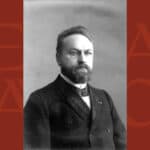
In Preparing Sermons from the Page to the Pulpit: Exegesis to Exposition in Seven Steps, Wayne Baxter helps pastors move from study to sermon. In seven steps, preachers are guided to take their exegetical analysis of a Scripture passage and turn it into an effective expository sermon. During our interview below, Baxter shares how he learned that his job as a preacher is to bring the audience to a sanctifying encounter with the God of the Scriptures, and that this holy encounter involves helping them to know God and then to obey him through application.
Lexham Press: What is the story behind Preparing Sermons from the Page to the Pulpit: Exegesis to Exposition in Seven Steps and what is your book’s basic thesis?
Wayne Baxter: Numerous students in seminaries and Bible colleges who study the original languages experience a disconnect between the training they receive in the original languages and sermon writing. They have been given the essential tools to better understand the ancient text, but they struggle with how to connect Greek and Hebrew to sermon writing. The messages they produce tend to get bogged down by technical details and are too hard to digest.
In the pulpit ministry of the church today, there remains a gap between the study and the pulpit. Preparing Sermons from the Page to the Pulpit bridges this divide. Written from the perspective of a New Testament scholar and Bible expositor, this monograph will enable seminary or Bible-college-trained pastors to write better expository sermons, specifically as it pertains to moving from the exegesis of a biblical text to the explanation of that passage in the pulpit. Preparing Sermons serves as a handbook to help the exegete move from analysis in the study to proclamation in the pulpit.
LP: What contribution do you hope to make with Preparing Sermons from the Page to the Pulpit?
Baxter: The pulpit offers a window into the life of a church: as the preaching goes so goes the church. Sadly, expositional Bible preaching has been lacking in most evangelical churches in most denominations for decades, and the church has suffered in different ways as a result, including increasingly disengaged congregants, as well as theological and biblical immaturity. Many seminary-trained pastors try to preach expositionally, but they need further, specific instruction. Still others do not even know how to do it at all. I wrote my book to address this very central issue in the evangelical church. Preparing Sermons helps to move the exegete along, in step-by-step fashion, from the detailed process of exegesis to preaching expository sermons, that I believe can help stem the tide of spiritual deterioration in the church.
LP: Describe a particularly surprising or enjoyable aspect of writing your book.
Baxter: The original draft of my book did not have chapter 8, which deals with sermon application. The publisher recommended that I deal with this topic: so, I did; and I learned a lot in the process! I learned that my job as a preacher is to bring the audience to a sanctifying encounter with the God of the Scriptures, and that this holy encounter involves helping them to know God and then to obey him through application.
LP: Share with us something surprising about yourself that only your friends would know.
Baxter: I’m the youngest son of the youngest son of the youngest son. You would think that would make me the heir to some throne somewhere, but it doesn’t.







